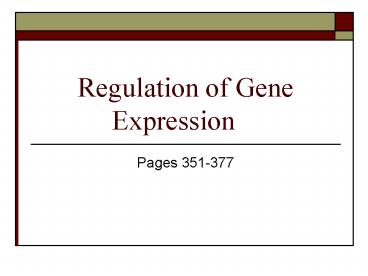Regulation of Gene Expression - PowerPoint PPT Presentation
1 / 21
Title:
Regulation of Gene Expression
Description:
A program of differential gene expression leads to the different cell types in a multicellular organism. Cancer results from genetic changes that affect cell cycle ... – PowerPoint PPT presentation
Number of Views:113
Avg rating:3.0/5.0
Title: Regulation of Gene Expression
1
Regulation of Gene Expression
- Pages 351-377
2
Key Concepts
- Bacteria often respond to environmental change by
regulating transcription. - Eukaryotic gene expression can be regulated at
any stage. - Noncoding RNAs play multiple roles in controlling
gene expression. - A program of differential gene expression leads
to the different cell types in a multicellular
organism. - Cancer results from genetic changes that affect
cell cycle control.
3
18.1 Bacteria often respond to environmental
change by regulating transcription.
4
Operons- Tryp and Repressible Operon
5
Lac Operon- An inducible enzymes
6
Positive Gene Regulation
7
18.2 Eukaryotic gene expression can be regulated
at any stage.
- Differential Gene Expression
- Regulation of Chromatin Structure
- Histone modification
- DNA Methylation
- Regulation of Transcription Initiation
8
Stages of gene expression that can be regulated
9
Eukaryotic Gene Organization
10
Enhancers and Activators
11
Mechanisms of Post Transcriptional Control
- RNA processing
- mRNA degradation
- Initiation of Translation
- Protein processing and Degradation
12
18.4 A program of differential gene expression
leads to the different cell types in a
multicellular organism
- Cell Differentiation
- Morphogenesis
- Cytoplasmic determinants and Inductive signals
- Determination and Differentiation
- Pattern formation
13
Determination and Differentiation of Muscle Cells
14
Life cycle of drosophilia
15
From egg to larvae
16
18.5 Cancer results from genetic changes that
affect cell cycle control
- Oncogenes and proto oncogenes
- Tumor suppressor genes
17
Proto-oncogenes can become oncogenes
18
Cell cycle stimulating pathway
19
Cell cycle inhibiting pathway
20
Effects of Mutations
21
Multistep path to cancer































